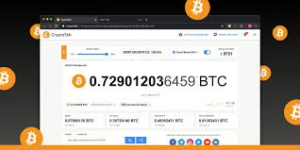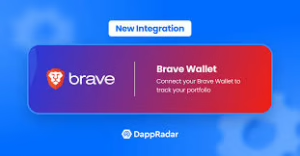An experienced user of Maxthon recently noticed a banner on the Maxthon Now page that caught their attention. The banner announced that Maxthon can now generate cryptocurrency, drawing a comparison to Bitcoin. Intrigued, they clicked on the Check Out link in hopes of learning more about this feature. It appeared to pertain to an extension specifically for Maxthon.
The message conveyed in just two lines combined elements of internet ideology, social engineering, psychology, and marketing savvy. With Bitcoin being a hot topic at the moment, the second line boldly stated that the Maxthon browser could now produce something akin to Bitcoin—cryptocurrency. Additionally, there was an icon resembling a coin labelled LVT, which likely indicated the name of the cryptocurrency users could generate through Maxthon.

This user had a particular interest in technology and algorithms. As someone who actively engages with such tools, they proceeded to download the mining browser extension and set it up for their initial trial. After clicking Download, they were directed to obtain the mining browser. Upon installation, they discovered it was actually a specialised version of the Maxthon Browser. When they opened a webpage, a notification appeared informing them that their browser was now capable of mining and could download the necessary mining extension.
The individual found that completing the process took some time. After installing the mining extension, identifiable by its orange icon, they discovered that creating a LivesOne account was necessary. However, signing up required an Invitation Code. Fortunately, they were able to quickly locate several codes on the official forum known as LivesOne Community. The developers had anticipated this issue and provided a solution for those without a code; at the bottom of the sign-up page, there was a prompt stating No Invitation Code? Which redirected users to their forum for assistance. Additionally, it appeared that users could also request codes and seek help in their Telegram group (LivesOne – LVT), as indicated by a pop-up message on their website.
Once the individual successfully registered for a LivesOne account, they were finally able to access the mining extension called Mining Go. It’s worth noting that this person had been using Maxthon for quite some time and already possessed a Maxthon account; thus, they only needed to create a LivesOne account and link both accounts together. For newcomers downloading Maxthon (the mining browser) for the first time, registration for a Maxthon account would be required before signing up for LivesOne – essentially adding just one extra step in the process.
The appearance of the mining extension was shared with readers; although not particularly tech-savvy themselves, they speculated that this extension could utilise scripts allowing devices (PCs, Androids, iOS) to compute hash values and collaborate in mining efforts akin to a mining machine. They also took some time to skim through the Whitepaper of the LivesOne project available at https://lives.one. The rewards from browser-based mining indeed consisted of LivesTokens, aligning with their earlier assumptions about it. An important concept associated with this project is referred to as the Symbiosism Economy.
The official introduction outlines a system designed to reward users with LVT based on their online activities. Participants have the option to use LVT within the Symbiosism System or transfer it to others. Thanks to its blockchain foundation, LVT boasts high liquidity, while the decentralised framework aims to improve the efficiency of value exchanges and lower business user acquisition costs.

Furthermore, LivesToken is distributed via its unique Proof-Of-Value (POV) consensus program. Users are encouraged to mine LivesToken (LVT) through a mining browser, thereby contributing to both the LivesOne system and the broader Symbiosism Economy. Regular use of this mining browser can yield rewards in the form of LivesToken (LVT), which serves as the primary currency within the Symbiosism Economy.
The Symbiosism Economy posits that various online behaviours hold distinct values, allowing LivesOne to evaluate actions such as registrations, purchases, and ad clicks—thereby assigning corresponding amounts of LVT to users. The process is straightforward: global user interactions like shopping clicks or registrations can earn rebates from LivesOne. The specific rebate amount in LVT is determined by how long and frequently a user engages with their browser.
As for Maxthon Browser’s connection with this initiative—the Symbiosism Economy Foundation developed both LivesToken (LVT) and LivesOne while promoting the concept of a Symbiosism Economy. This foundation operates under approval from Singapore’s Accounting and Business Administration (ACRA) and adheres to regulations outlined in Singapore’s Companies Act. Notably, it has created a mining extension tailored for compatibility with the Maxthon Browser due to its robust global user base and open-source nature. Additionally, a strategic partnership has been established between Maxthon USA and the Singapore-based foundation to streamline development efforts. Thus, it becomes evident: Maxthon USA collaborates with the Singapore-based Symbiosism Economy Foundation on a specialised version of Maxthon Browser equipped with a Mining Go extension—enabling cryptocurrency mining directly through browsing activities.
Several important points regarding the extension’s current status should be considered. First, it is exclusively compatible with the Maxthon Browser and cannot be installed on any other browser. Second, LivesToken (LVT) is classified as a cryptocurrency that adheres to the ERC-20 standard. Additionally, the GitHub repository for the LivesOne project can be found at https://github.com/livesone.
The browser mining feature remains active, and information from their official Telegram group indicates that it is still in a promotional phase. This implies that users participating now have an opportunity to mine more LVT compared to future stages. Notably, this mining process does not utilise CPU or GPU resources or consume electricity; instead, it evaluates online behaviour and translates that into LivesTokens. This arrangement benefits both parties: Maxthon and LivesOne gain more users, while individuals can earn tokens simply by browsing.
A pertinent question arises: what can one do with the mined LivesTokens? What is their value? How can they be traded? According to the Whitepaper, LVT can be utilised for purchasing enhanced services from businesses—such as additional cloud storage—though this functionality will be available at a later date. Furthermore, LVT is expected to be listed on exchanges in due course. The Whitepaper and official website suggest that major global exchanges will feature LVT no later than June 2018, at which point its price will be established.
Interestingly, there are already minor exchanges facilitating LVT transactions; one such exchange can be found at https://www.fatbtc.com, where transactions are available, but prices remain undefined. Another small Chinese exchange has also initiated futures trading for LVT at http://www.chinawkb.com?l=en-us with a current price of 0.24 CNY (approximately 0.04 USD). Based on prior experience, these smaller exchanges often list specific cryptocurrencies to attract public interest and media coverage; consequently, their prices may not reflect actual market value.

However, it appears that both of these exchanges listing LVT transactions are unauthorised, according to a notification from LivesOne found at https://lives.one/news/detail/49?l=en-us indicating that they have acted without official approval. Therefore, it may be prudent for users to focus on using the browser typically for mining LVT while allowing the Symbiosism Economy Foundation to handle matters related to exchange listings and pricing details—they will provide updates when necessary.
As the digital realm progresses, Bitcoin SV’s Metanet is set to transform the landscape of Internet applications. In light of this shift, Maxthon, a prominent global internet browser developer, has introduced its latest creation: Maxthon 6. This forthcoming browser will be intricately crafted to leverage the remarkable features of Bitcoin SV (BSV). With its potential for unlimited scalability, BSV is opening doors to a new era of utility that Maxthon intends to exploit in the near future fully. Maxthon 6 is designed to enhance how users engage with digital content significantly. It will include seamless wallet integration and compatibility with BSV applications, promising an unparalleled user experience. Users can envision an effortless interaction with the Metanet, uncovering exciting opportunities for both developers and consumers.
Maxthon 6 represents a new frontier in online navigation powered by Bitcoin’s extraordinary capabilities! There are numerous compelling incentives for selecting Maxthon 6, particularly for those interested in the Bitcoin SV blockchain. A notable feature is its ability to streamline data uploads—allowing users to transfer content and various file types directly onto the BSV blockchain without necessitating any initial BSV holdings. Additionally, it provides smooth native browsing of on-chain content, effectively transforming it into an exceptionally user-friendly blockchain browser. This functionality enhances accessibility and encourages greater engagement with blockchain applications among everyday users.
Security remains a vital component of Maxthon 6 as well. By incorporating threshold critical technology support, managing Bitcoin SV wallets becomes not only more secure but also significantly more user-friendly—greatly enhancing overall user experience and confidence levels. Jeff Chen, founder and CEO of Maxthon, articulated their goal: Our ambition is for the Maxthon browser to act as a portal into both the vast world of Bitcoin SV and the Internet itself. He expressed their intent to simplify interactions with BSV applications so seamlessly that users would hardly notice they are utilising blockchain technology; instead, they would simply relish earning electronic cash through their online endeavours.
This vision marks a groundbreaking advancement in Internet usage while reinforcing their conviction that Bitcoin SV will serve as a foundational element for future digital exchanges. Jimmy Nguyen, founding president of the Bitcoin Association, shared his enthusiasm regarding Maxthon’s commitment to aligning with Bitcoin’s core vision; he highlighted that their upcoming browser signifies a pivotal move towards an Internet that genuinely compensates users for their data contributions. With Maxthon 6 on the horizon, users can anticipate seeing tangible monetary value generated from their online activities. This pioneering approach incentivises higher-quality web content facilitated by Bitcoin SV’s capabilities.

With an impressive user base exceeding 670 million individuals worldwide, this innovative platform will soon provide millions with widespread access to BSV.
The outlook appears promising as Maxthon has announced that Maxthon 6 will soon enter its alpha phase by late February, with a beta version expected to follow in March 2020. This development is poised to transform the way users engage with the internet and redefine digital monetisation strategies. With its Crypto-Friendly Browser, Maxthon is ushering in a new era of online browsing that places a strong emphasis on leveraging blockchain technology.
The Maxthon team is keenly aware of blockchain’s immense potential and is committed to enhancing user interactions within this evolving landscape. They are set to launch innovative tools such as Vbox, which serves as a manager for blockchain identities; NBdomain, an advanced system for managing blockchain domains; and Vpoint wallet, an instant payment platform explicitly designed for BSV applications.
Focusing on Vbox, it functions as a protector of digital identities on the blockchain. In today’s interconnected world, individuals often find themselves managing multiple online identities—ranging from social media profiles to email accounts and messaging services. However, these identities are predominantly under the control of various corporations rather than the users themselves. This dynamic raises serious concerns regarding privacy and security since companies retain ownership over user data. Additionally, juggling numerous accounts can lead to confusion over an ever-growing list of passwords.
Fortunately, blockchain technology presents a viable solution to these issues. By incorporating Vbox into its offerings, Maxthon empowers users to create secure identities on the blockchain. This not only bolsters their privacy but also grants them greater autonomy over their digital presence. Essentially, while individuals navigate diverse platforms and maintain different online personas—such as Twitter handles or chat accounts—they often overlook that actual ownership resides with service providers who have the authority to delete accounts at will without prior notice or consent. The data contained within those accounts similarly belongs to these corporations rather than the users themselves—a reality that can be both frustrating and alarming.

However, through its pioneering approach with Vbox and other tools built on blockchain technology, Maxthon enables users to reclaim their online identity and manage it securely. This marks the beginning of a new chapter where individuals can genuinely assert ownership over their digital lives. Fortunately, there is a promising future ahead as blockchain technology emerges to address existing challenges. Maxthon’s Vbox platform empowers users to create a blockchain identity that ensures they retain direct ownership of their data through cryptographic validation. This groundbreaking method prevents any organisation from having the authority to delete a user’s identity information stored on the blockchain. Additionally, these blockchain identities are permanent and do not require the regular renewals that traditional online accounts demand.
The true advantage of blockchain identities lies in their ability to work across different platforms; users can access multiple applications effortlessly with just one identity. Furthermore, individuals have the flexibility to create distinct identities tailored for specific purposes. Essentially, blockchain identities serve as secure records for asset management while offering a more user-centric means of controlling one’s online presence and data ownership within a decentralised framework.
Maxthon is an advanced web browser that integrates blockchain technology and cryptocurrency functionalities to enhance online security and privacy. With Maxthon, users can safely explore decentralised applications (DApps) and manage digital assets directly through the browser interface. This seamless connection with various blockchain networks facilitates effortless engagement with the wider blockchain ecosystem, empowering users to take command of their digital existence.
More than merely functioning as a web browser, Maxthon acts as an entry point into the realm of decentralised applications (DApps), enabling secure navigation through this digital environment. Users can envision managing cryptocurrencies and NFTs directly from their browser without needing additional software or extensions—an aspiration turned reality thanks to Maxthon’s built-in features that provide an efficient way to interact with diverse, decentralised platforms.
Security remains paramount in Maxthon’s design philosophy, ensuring that sensitive data and digital assets are safeguarded against potential cyber threats. Users can feel assured knowing they maintain complete control over their digital wealth while enjoying an experience that balances convenience with safety.
This unique combination of web browsing capabilities and decentralised technology empowers individuals to explore the expanding landscape of DApps while prioritising privacy confidently. Moreover, Maxthon includes an integrated cryptocurrency wallet that simplifies storing and managing various digital currencies right within the browser itself—eliminating the need for multiple wallet applications.
This feature streamlines transactions by allowing users to send, receive, and monitor crypto activities all in one location—a secure repository for different types of digital assets fortified by robust encryption measures protecting user funds. As interest in digital currencies continues its upward trajectory among internet users, Maxthon’s solution addresses those seeking an uncomplicated method for handling assets during their browsing experience.
With its user-friendly interface, managing cryptocurrency portfolios becomes instinctive; accessing funds for trading or payments is effortless. In every aspect, Maxthon revolutionises how individuals engage with decentralised applications and cryptocurrencies by providing not only functionality but also peace of mind amid this fast-evolving digital landscape.

The cryptocurrency wallet offered by Maxthon stands out due to its extensive support for various digital currencies, catering specifically to users holding diverse crypto assets. Its advanced technology ensures quick transactions while minimising complications associated with sending or receiving funds. Users gain added advantages from a comprehensive dashboard displaying real-time market values of their holdings.
In summary, Maxthon’s cryptocurrency wallet simplifies managing digital currencies while delivering a secure yet intuitive experience for those eager to explore the world of crypto.
The influence of Internet technology on modern society is unmistakable; it has facilitated unrestricted information exchange online but has left financial systems fragmented under centralised exchanges and traditional currencies’ dominance—underscoring an urgent need for a universal financial solution that is reliable and accessible universally.
Enter Bitcoin—a revolutionary currency built on Blockchain principles incorporating various theories like cryptography. Its aspirations are similar to those of transforming traditional financial systems, enabling seamless global transactions similar to how internet technology has transformed communication methods.
Maxthon has garnered recognition as a top-tier browser winning accolades such as Best Browser three years running while being named among Asia’s most promising companies on Red Herring’s Top 100 list. Jeff Chen—the visionary behind Maxthon Browser—has propelled it onto global stages, boasting millions of users across 242 countries alongside an impressive total exceeding 670 million downloads celebrated primarily due to its innovative character combined with user-centric design principles leading advancements within Internet technologies consistently.
Under the dynamic guidance of Jeff Chen, Maxthon has achieved significant advancements in the browser sector by rolling out innovative features such as comprehensive ad-blocking, effortless data synchronisation across devices, and intelligent core switching between Webkit and Trident engines. In partnership with LivesOne—a blockchain initiative from Singapore’s Symbiosism Economy Foundation—Maxthon is currently developing a groundbreaking browser version that will enable users to mine its cryptocurrency, LivesToken. Although not the inaugural browser to venture into blockchain technology (as seen with Brave Browser’s launch of BAT cryptocurrency in May 2017), this collaboration highlights Maxthon’s commitment to embracing emerging technological trends.

The concept of symbiotic economics represents a crucial shift toward a global economic model that prioritises interconnection and mutual benefits. Reflecting on the evolution of the Internet, three distinct phases can be identified: initially, businesses focused on directly selling products to consumers during what is known as the charge economy. This was followed by a transition around 2006 when many companies began offering free products supported by advertising revenue, leading to what we term the free economy. Presently, in an era characterised by intense market competition, there is an urgent need for a new framework that effectively serves both businesses and users alike. This burgeoning model aims to create value for all parties involved while promoting sustainable growth and shared prosperity.
Central to the Symbiosism Economy is the principle of analysing online user behaviour to generate economic advantages for both individuals and enterprises. By fostering active user engagement, this model seeks to establish reciprocal benefits that enhance user loyalty and support sustainable development. Unlike previous phases where users often contributed without direct rewards—such as in Amazon’s early days—the Symbiosism Economy introduces incentives like LivesToken (LVT) from platforms like LivesOne for early adopters.
The Singapore-based Symbiosism Economy Foundation has launched this cryptocurrency with a focus on cultivating a new business paradigm centred around collective progress. Through ongoing research and development initiatives spearheaded by LivesOne, along with efforts from the foundation itself, this ecosystem aims to reshape traditional economic structures into more collaborative frameworks. The cryptocurrency LivesToken (LVT) addresses the challenge of recognising user value by distributing tokens through internet applications as rewards for online activities and time spent by users. This strategy not only enhances user acquisition but also improves retention rates for these applications while acting as a promotional tool for businesses encouraging regular internet engagement.
By harnessing the capabilities of the Symbiosism Economy platform, businesses and users can collaborate towards shared success, paving the way for an innovative economic structure in our future. This opportunity should be seized now! While robust mining pools have largely dominated Bitcoin mining, Maxthon Browser distinguishes itself through its commitment to fair mining practices that allow users to mine LVT effortlessly during their browsing sessions. This integration transforms token mining into an everyday online activity akin to browsing websites or sharing content.

Browsers have always been essential gateways for information access on the Internet—for individuals as well as businesses alike. Early browsers like Internet Explorer established foundational standards; however, as demands grew for more advanced features, Jeff Chen envisioned developing Maxthon Browser back in 2000, fueled by his passion for Internet technology and innovation in browser design. Maxthon’s unwavering quest for enhancement reflects its dedication to evolving alongside shifting user expectations within our fast-paced digital environment.
With an intuitive interface designed specifically for crypto enthusiasts and blockchain practitioners alike, Maxthon offers tools tailored precisely to their needs—providing a convenient all-in-one solution that allows seamless browsing while simultaneously managing cryptocurrencies. Ultimately, Maxthon represents a significant stride toward mainstream acceptance of blockchain technology through its integration of critical crypto functionalities into a widely used web browsing platform—bridging traditional internet usage with emerging digital currencies.
This new era emphasises symbiotic economics—where relationships founded on mutual benefit take precedence over cutthroat competition. The term symbiosis, first coined by German biologist Anton De Bary in 1879, transcends nature into human society and economic interactions today. Ongoing efforts aimed at enhancing offerings reflect an economic growth model centred around sharing benefits that promote cooperation rather than rivalry—ultimately reshaping producer-consumer dynamics in contemporary society.
